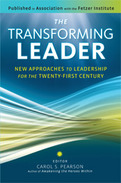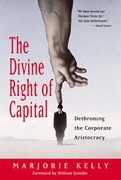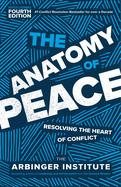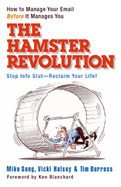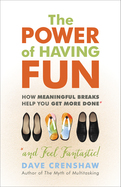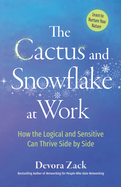Outlines a new leadership approach tailored to the realities of the 21st Century.
No organizational leaders can succeed in today’s fast evolving and highly connected world on their own. To succeed, today’s leaders must not only optimize all their own faculties—mental sharpness, emotional depth, imagination, and creativity—but also utilize the full capacities of those around them in a collaborative and creative manner. The prestigious contributors to this volume draw on psychology, sociology, neuroscience, social networking theory, organizational change theory, myths and traditions, and actual experiences to discover how leaders today achieve transformational results. The Transforming Leader offers an overview of what transformational leadership is, how it works, and how it is evolving. In doing so it reframes the challenge of leading in today’s interdependent, unpredictable world.-
Outlines a new leadership approach tailored to the realities of the twenty-first century
-
Features chapters by such leading authors as Matthew Fox, Diana Whitney, and Alan Briskin
-
Edited and annotated by the author of the bestselling The Hero Within
The traditional model of the heroic leader single-handedly piloting the organization was always something of a myth, but it is especially unrealistic now. We live in a complex, fast-evolving, highly connected world. There is simply too much for a single person to keep track of or to address successfully. Leaders today must not only optimize all their own facultiesmind, body, and spiritthey must harvest the full capacities of those around them.
To discover what leadership models are working now, the prestigious Fetzer Institute, along with the University of Marylands School of Public Policy, and the International Leadership Association, brought together an impressive, interdisciplinary group of scholars and practitioners. The group drew on psychology, sociology, neuroscience, organizational change theory, myths and wisdom traditions, social networking theory, and the actual experiences of successful leaders to discover how leaders today achieve transformational results.
The first part of the book offers an overview of what transformational leadership is, how it works, and how it is evolving. The second part shows readers how to increase cognitive complexity, link up their conscious and unconscious minds, and lead in ways that connect mind, heart, and spirit. The third part describes ways of leading groups to harvest collective wisdom and promote coordinated performance in the service of transformational ends. The conclusion explores how transformational communication can anchor new learnings so that they become habitual.
Overall, The Transforming Leader reframes the challenge of leading in todays interdependent, unpredictable world. Its message is that if we update our thinking, enhance the quality of our being, deepen our sense of relatedness with the ecology of our natural and social worlds, and practice transformational communication, things no longer have to be so hard.
- Updated paperback edition includes a new chapter and a Reader's Guide
- Explores the real causes of the Enron fiasco and other recent corporate scandals
- Explodes the myth that the stock market is "democratizing" wealth
- Gives practical guidance to help employees and communities change corporate governance and unfetter the genius of the free market
What if conflicts at home, at work, and in the world stem from the same root cause? What if we systematically misunderstand that cause? And what if, as a result, we unwittingly perpetuate the very problems we think we are trying to solve?
The Anatomy of Peace uses a fictional story of an Arab and a Jew—both of whom lost their fathers at the hands of the other's cousins—to powerfully show readers the way to transform conflict. We learn how they come together, how they help parents and children come together, and how we too can find our way out of the personal, professional, and social conflicts that weigh us down.
The fourth edition includes revisions and new materials and resources that increase its relevance and usefulness at a time of deeply entrenched divisions throughout society. Additionally, it includes new detailed discussions of the pattern of dehumanization that lies at the heart of today's most pressing struggles with prejudice and discrimination—challenges that cannot be solved until the origins of bias and discrimination are properly understood and addressed. The new edition is a unique and vital resource for combatting racism and prejudice in their many manifestations.
Just in time, Harold meets a coach—a leading expert on email efficiency and etiquette with a simple system that helps Harold eliminate needless emails, write better messages, and file and find information in a flash. He gets immediate results—and reclaims his life.
The Hamster Revolution is chock-full of practical advice that really works. Included is a landmark case study that shows how 2,000 Capital One associates cut their email time by 23 percent while improving overall email quality by 52 percent.
Professionals waste up to a month per year on email—costing their companies billions in missed opportunities. The good news? Hope and help are here. The Hamster Revolution is the definitive book for our times.
If you want to be successful, having fun is not an option. It's a necessity. By making fun a top priority—taking meaningful, enjoyable breaks each day, week, month, and year—you'll not only be happier but be more productive, too!
Using scientific evidence, real-world case studies, and a healthy dose of wit, bestselling author Dave Crenshaw shows that a regular respite is like a little oasis in your workday. It refreshes and reinvigorates, recharges your batteries—helping you accomplish more with less effort!
The Power of Having Fun coaches you through the five-step system thousands of leaders have utilized to boost productivity and propel their careers—all while feeling fantastic! Let Dave Crenshaw lower your stress, raise your results, and restore recess to your routine.
Carl Jung's personality typology introduced the distinction that Feelers (who lead with their hearts) put more weight on personal concerns and the people involved, and Thinkers (who lead with their heads) are guided by objective principles and impartial facts. This book calls them Cacti and Snowflakes—each singularly transcendent. But can people with such fundamentally different ways of making sense of and engaging with the world work together?
Yes, says Devora Zack! The key is not to try to change each other. Zack says we can directly control only three things: what we say, what we think, and what we do. The best use of our energy is to focus on our own reactions and perceptions rather than try to “fix” other people.
This book includes an assessment so readers can learn where they are on the Thinker/Feeler spectrum—and because it's a spectrum, readers might well be a snowcactus or a cactusflake. Then Zack helps them figure out where other people might be, guiding them through a myriad of modes of communication and motivation based on personality type. She includes real-life scenarios that show how to nurture one's nature while successfully connecting with those on the other side.
As always, Zack fearlessly and entertainingly dispels myths, squashes stereotypes, and transforms perceived liabilities into strengths. And she once again affirms that, like chocolate and peanut butter, we are better together.


